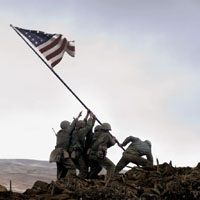Interview: Clint Eastwood

Clint Eastwood is either a workaholic or a true artist with infinite resources of creativity to explore. The enduring success of his work suggests the latter, even though the occasional Blood Work seems like a place filler. Stepping behind the cameras, Eastwood commits all his energies to telling stories, but not just any stories. Flags of Our Fathers is a World War II tale involving the battle of Iwo Jima, but the real story happens when soldiers photographed raising the American flag come home and sent on tour to sell war bonds.
"We tried to show the propaganda machine as it actually appeared," said Eastwood. "Yeah, growing up, we watched all the war movies. War movies always were very propaganda-istic. There's always the bad guys and the good guys. I think the icon itself of the flag-raising, a candid shot which was sort of a manufactured shot at the time, it didn't have any significance at the moment because it was a separate flag-raising but it was just a shot that was very rare. It's a work of art. The men obviously were almost as much affected by the bond drive as they were by the combat. But the bond drive was a very strenuous thing for young men, to be sent out and treated like kings and then to have to all of a sudden, the rug's out from under them and they go back to civilian life and there's nowhere to go."
Dealing with all aspects of the war, the film based on James Bradley's book intercuts between the battle, the bond drive and the elderly marines in modern day. The third element was required to connect the previous two.
"I did it with a picture called Bird years ago and I had difficulty in going into flashback, then a flashback within a flashback, and then having to unwind and come back and keep the audience only moderately confused, to get back to the present day of that particular picture [whose] present day was in the 40s as well. But we finally decided this was the way to do it, because Jim Bradley wrote his book as he was researching, doing literally a detective story going around and talking to people. It laid out that way. It just seemed like a logical way to do it. Otherwise it's a very big sprawling book, and it covers a lot of chapters on a lot of various items. You have to sit there and figure out what story we want to do: just the bond drive or the battle. But you have to have the impact of the battle to show the complexities of the bond drive, of the emotions of the guys."
Someone like Ira Hayes, played by Adam Beach, was so despondent over being stuck on a sales tour instead of back with his unit in battle, he became an inconsolable alcoholic. "Ira Hayes was a complex person, a person who did sharecropping, a kid from Arizona who went to the Marine Corps. Suddenly he's in the Marine Corps and he's got a uniform and he meets a lot of friends. He found sort of a family in the Marine Corps. He liked it to the point where he wanted to stay there. Everything in this picture is true. He didn't want to come back to the States after combat and do what they're doing. He had a problem with alcoholism and everywhere they went, they were serving him drinks. That could be not conducive to a good situation for a person with his feelings, attraction to alcohol."
Eastwood hopes to avoid parallels with modern wars, and prefers if people appreciate the sacrifices of past generations on their own. "I just wanted them to get to know these people, know what they went through. Maybe give the audience a feeling of what it was like in that time, what these people dedicated their lives or donated their lives for. Just in general, just find out these kind of people. There have been books written about it, and Brokaw's book of course, The Greatest Generation and a lot of people, a lot of talk about the greatest generation so it was fun to just try to visualize the greatest generation. We live in a time now where it's different. We have an all voluntary military. The country's a lot more comfortable now as far as economically. Those times would come out of rough economic times. The country in fact right now we're probably a lot more spoiled than we were then, so the idea, war is more of an inconvenience now where then it was an absolute necessity."
Flags of Our Fathers opens Friday.
CINEMABLEND NEWSLETTER
Your Daily Blend of Entertainment News

After Law And Order: SVU Gave Carisi The 'Wake-Up Call' He Needed, Peter Scanavino Talked Filming His Most Emotional Moments With Mariska Hargitay

After SNL50: Beyond Saturday Night Dug Deep Into Will Ferrell's Iconic Cowbell Sketch, The EP Discussed Tracking Down Old Footage: 'Somebody Had A VHS Tape'
Most Popular






